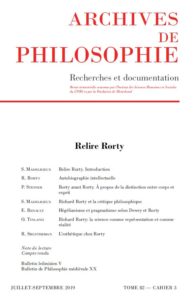 Volume 82, Issue 3, July-September 2019
Volume 82, Issue 3, July-September 2019
Returning to Rorty
 Stéphane Madelrieux, Returning to Rorty. Foreword
Stéphane Madelrieux, Returning to Rorty. Foreword
Richard Rorty, Intellectual autobiography
In this autobiographical article, Richard Rorty engages in a very personal meditation on his youth, his intellectual training and the philosophical issues related to the progressive development of his thought. Referring to the various stages of his academic career, he offers us a striking picture of the American academic world of the 1960s–1980s and a valuable reflection on the authors who influenced him, as well as on the scope and limits of his own works.
Pierre Steiner, Rorty before Rorty. On the mind/body distinction
In this paper, I argue that there is significant continuity between Rorty’s early analytical works in the philosophy of mind and the later development of his pragmatism. The concept of vocabulary, and the sense of the contingency of the intentional and mental vocabularies in our lives, define Rorty’s original position in the literature on the mind-body problem. Early Rorty’s deflationism will be later developed into a post-ontological philosophy of mind, significantly different from Putnam’s and Brandom’s approaches
Stéphane Madelrieux , Richard Rorty and the idea of philosophical criticism
Richard Rorty promotes a therapeutic conception of philosophy, conceived as a criticism of the pointless problems of the tradition rather than an attempt to build positive theories. This article seeks to better identify the type of criticism he proposes by clarifying its relation to pragmatism. It argues that Rorty has a twofold relation to pragmatism: as a specific tradition of critical philosophy on the one hand, which brings together analytic and continental philosophies in a common rejection of foundationalism; and as a metaphilosophical position on the other hand, which aims at removing all remaining traces of foundationalism from, at the first level, classical pragmatism.
Emmanuel Renault, Hegelianism and pragmatism in Dewey and Rorty
Rorty’s contribution to the renewal of interest in Dewey is linked with the fact that he has depicted him as one of the main philosophers of the twentieth century, alongside Wittgenstein and Heidegger. He also pointed out that Dewey should be read as a synthesis of Darwin and Hegel. Moreover, he contended that the contemporary relevance of Dewey’s philosophy is dependent on its capacity to critique the limitations of the analytical paradigm, in tune with Hegel’s criticism of Kant. This article analyses this paradoxical conception of the relationship between American pragmatism and Hegelianism, and his original account of the contemporary relevance of both Hegel and Dewey
Olivier Tinland, Richard Rorty: Science as representation and as solidarity
Contrary to the great figures of classical pragmatism (Peirce, James, Dewey, Mead), Richard Rorty has often been accused of advocating an irrationalistic thinking, averse to science. In this article, I intend to qualify such a verdict by presenting the issues, inseparably philosophical and metaphilosophical, of the debate that Rorty has started with the main branches of contemporary philosophy of science, about topics such as essentialism (science as a “natural kind”), scientific realism and instrumentalism. I also intend to assess the way in which Rorty has redescribed scientific activity as aimed at solidarity and poetic creation.
Richard Shusterman, Rorty’s aesthetics
Richard Rorty has an ambiguous relationship with the aesthetic. On the one hand, it is of crucial importance to his approach to philosophy, which in his eyes doesn’t have to depend on argumentation or reason, but is grounded in imagination and the creation of new vocabularies. On the other hand, he rejects (on anti-essentialist grounds) the field of aesthetics as a legitimate philosophical and cultural discipline. This article explores three major areas where Rorty valorizes the aesthetic dimension: the idea of interpretation in the philosophy of language, the ethical ideal of self-creation, and the link between poetry and social philosophy in his analysis of literature.
